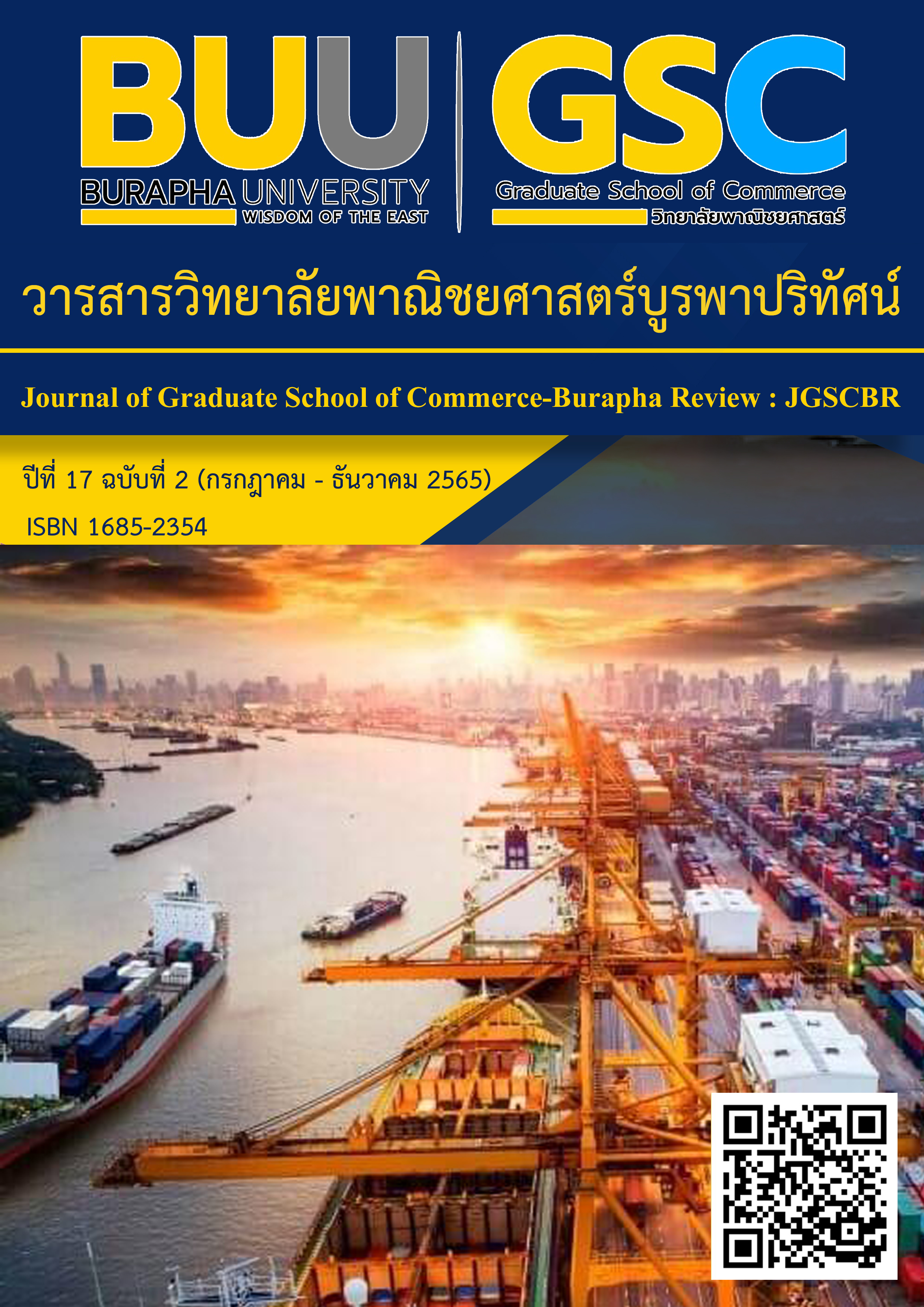FACTORS ANALYSIS BETWEEN TECHNOLOGY ACCEPTANCE MODEL OF RFID INFLUENCING BEHAVIORAL INTENTION TO USE FOR AUTOMOTIVE MANUFACTURING INDUSTRY ABC CO.,LTD IN EASTERN SEABOARDS INDUSTRIAL ESTATE, RAYONG PROVINCE. ปัจจัยการยอมรับเทคโนโลยี RFID ที่มีอิทธิพลต่อพฤติกรรมความตั้งใจนำไปใช้ปฏิบัติงานของพนักงานบริษัทอุตสาหกรรมผลิตชิ้นส่วนยานยนต์ บริษัท ABC จำกัด ในเขตนิคมอุตสาหกรรมอิสเทริน์ซีบอร์ด จังหวัดระยอง
Main Article Content
Abstract
การศึกษาครั้งนี้มีจุดประสงค์เพื่อศึกษาปัจจัยการการยอมรับเทคโนโลยี RFID ที่มีอิทธิพลต่อพฤติกรรมความตั้งใจ นำไปใช้ปฏิบัติงานของพนักงานบริษัทอุตสาหกรรมผลิตชิ้นส่วนยานยนต์ บริษัท ABC จำกัด ในเขตนิคมอุตสาหกรรมอิสเทริน์ซี บอร์ด จังหวัดระยอง โดยศึกษาจากกลุ่มตัวอย่างพนักงานบริษัทอุตสาหกรรมผลิตชิ้นส่วนยานยนต์ บริษัท ABC จำกัด ในเขต นิคมอุตสาหกรรมอิสเทริน์ซีบอร์ด จังหวัดระยอง จำนวน 397 คน ข้อมูลที่ใช้ในการวิเคราะห์ได้มาจากแบบสอบถาม วิเคราะห์ ข้อมูลโดยนำเอาข้อมูลดังกล่าวมาตรวจสอบข้อมูล (Data cleaning) ทดสอบความเชื่อมั่น (Reliability) ความเที่ยงตรง (Validity) แล้ววิเคราะห์อิทธิพลของตัวแปรด้วยแบบจำลองสมการโครงสร้าง (Structural Equation Modeling: SEM) โดยใช้ แบบจำลองมาจากทฤษฎีการยอมรับเทคโนโลยี หรือ Technology Acceptance Model (TAM)
ผลการวิเคราะห์ข้อมูล พบว่าแต่ละตัวแปรในแบบจำลองส่งผลอย่างมีนัยสำคัญกับตัวแปรปัจจัยการยอมรับเทคโนโลยี RFID ต่อพฤติกรรมความตั้งใจนำไปใช้ปฏิบัติงานของพนักงาน ผลลัพธ์จากการวิเคราะห์องค์ประกอบเชิงยืนยันของแบบจำลอง พบว่า ตัวแปรสังเกตได้มีความสอดคล้องกับตัวแปรแฝงเป็นอย่างดี เมื่อพิจารณาความสัมพันธ์โครงสร้างเชิงสาเหตุพบว่า แบบจำลองสมมติฐานมีความกลมกลืนกับข้อมูลเชิงประจักษ์ นอกจากนี้ความตั้งใจในการนำเทคโนโลยี RFID ไปใช้ในการ ปฏิบัติงาน สามารถอธิบายได้จากตัวแปรแฝงภายใน ได้แก่ การรับรู้ความสามารถตนเอง (Self-Efficacy) ความวิตกกังวลในการ ใช้งานคอมพิวเตอร์ (Computer Anxiety) การคล้อยตามสิ่งอ้างอิง (Subjective Norm) ประสบการณ์การใช้งาน (Previous Experience) พฤติกรรมความตั้งใจใช้เทคโนโลยี RFID (Behaviral Intention to Use) โดยความสัมพันธ์มีนัยทางสถิติที่ระดับ
0.001 ดังนั้นการรับรู้ประโยชน์ของเทคโนโลยี RFID (Perceived Usefulness) การรับรู้ความง่ายของการใช้งานเทคโนโลยี RFID (Perceived Ease of Use) และทัศนคติการใช้เทคโนโลยี RFID (Attitude toward usding) มีอิทธิพลต่อพฤติกรรมความ ตง้ัใจนำไปใช้ปฏิบัติงานของพนักงานบริษัทอุตสาหกรรมผลิตชิ้นส่วนยานยนต์ บริษัท ABC จำกัด ในเขตนิคมอุตสาหกรรมอิสเท ริน์ซีบอร์ด จังหวัดระยอง
Article Details

This work is licensed under a Creative Commons Attribution-NonCommercial-NoDerivatives 4.0 International License.
The owner of the article does not copy or violate any of its copyright. If any copyright infringement occurs or prosecution, in any case, the Editorial Board is not involved in all the rights to the owner of the article to be performed.
References
The purpose of this study was to determine the acceptance factors of RFID technology that influences the behavior of intention to use it in the work of employees of the automotive parts manufacturing company ABC Co., Ltd. in the Eastern Seaboard Industrial Estate, Rayong Province. A sample of 397 employees from ABC Company Limited in the Eastern Seaboard Industrial Estate, Rayong Province. The data used in the analysis were obtained from questionnaires. Analyze the data by bringing such information to check the data (Data cleaning) test the confidence. (Reliability), accuracy (Validity), and analyze the influence of variables with a Structural Equation Modeling (SEM) using a model from Technology Acceptance Model (TAM).
Data analysis results It was found that each variable in the model had a significant effect on the adoption factor variable of RFID technology on the employee's intention to implement behavior. The results from the corroborative component analysis of the model revealed that Observable variables are consistent with latent variables. When considering the causal structure relationship, the hypothesis model was found to be in harmony with the empirical data. In addition, the intention to implement RFID technology in operations. can be explained by the latent variables, namely, self-efficacy Self-Efficacy, Computer Anxiety, Subjective Norm, Previous Experience, Behavioral Intention to Use RFID Technology (Behaviral Intention to Use). Statistical implications at 0.01 level. Therefore, perceived benefits of RFID technology (Perceived Usefulness), perceived ease of use of RFID technology (Perceived Ease of Use), and attitude toward use of RFID technology (Attitude toward usding) influenced the behavior of RFID technology. Intended to use in the work of employees of the automotive parts manufacturing company ABC Company Limited in the Eastern Seaboard Industrial Estate, Rayong Province.


